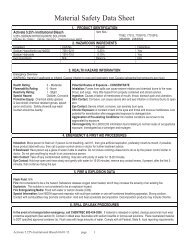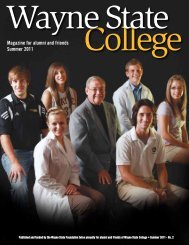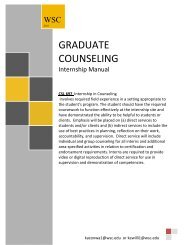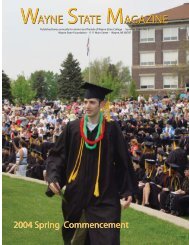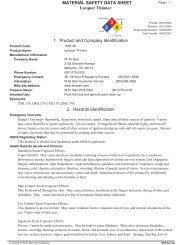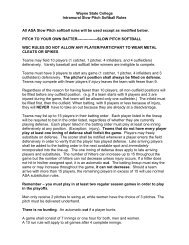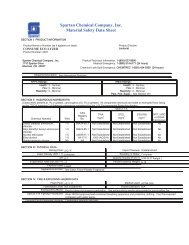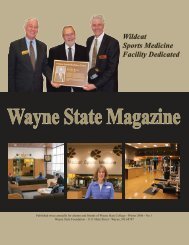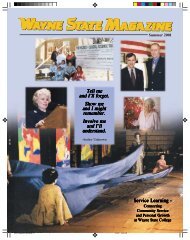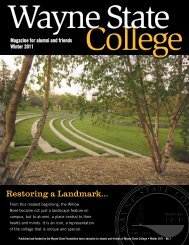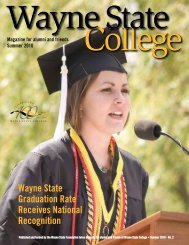Full Catalog - Wayne State College
Full Catalog - Wayne State College
Full Catalog - Wayne State College
- No tags were found...
You also want an ePaper? Increase the reach of your titles
YUMPU automatically turns print PDFs into web optimized ePapers that Google loves.
60 <strong>Wayne</strong> <strong>State</strong> <strong>College</strong>CHE 458 Physical Chemistry Lab (1) Prerequisite or corequisite:CHE 456. Laboratory investigations of physicalchemistry concepts including: the properties of gases,thermochemistry, chemical equilibrium, quantum chemistry,and spectroscopy. (3 hours lab)CHE 470 Research Project (1) Prerequisite: CHE 370. Thiscourse is a continuation of CHE 370. Students will takethis course as a means of completing their individualresearch project under the direction of a chosen instructor.A presentation of this research in both oral and writtenform is required at the conclusion of the course. Thiscourse may be repeated up to three hours.CHE 490 Chemistry Seminar (1-2) Prerequisite: 16 hoursof Chemistry courses. An advanced course of study forchemistry majors. Research and advanced reading in anarea chosen by the student and the instructor in charge.Course may be repeated with different topics.CHE 493 Laboratory Management (1-2 maximum of 2 hours)Prerequisite: C- or better in CHE 393. Management ofadvanced laboratories. Preparation of reagents, maintenanceof equipment, laboratory supervision, evaluationof student performance, grading of laboratory notebooks,instructions in experimental design. (6-12 hours a week)Eligible seniors may enroll in 500 level graduate courses.Communication Arts (CNA)Communication Arts DepartmentSchool of Arts & HumanitiesHumanities BuildingThe Department of Communication Arts consists ofthe Speech Communication, Mass Communication, andTheatre programs. The department is an interdisciplinaryunit that offers students the opportunity to develop practicalcommunication skills through application in oratory andrhetoric, the performing arts, technology and media, as wellas understanding of the theories and ethical tenets that arethe cornerstone of the study of communication. Students areencouraged to complete internships, co-ops, honors projects,travel abroad, and service learning opportunities as part oftheir undergraduate experience. The Bachelor of Arts degreeis preferred for all Communication Arts Majors. See B.A.degree requirements.In accordance with the college’s policy on assessment ofstudent work, each student is required to compile a portfolioof work examples from courses taken in the major. Theportfolio is intended to act as additional evidence of studentaccomplishment and skills. Items can include, but are notlimited to: student performances and speeches, resumes, videoand audio productions, research reports, design projects,articles published, etc. A student’s portfolio will be developedwith the student’s advisor to reflect each area of studentcompetence.Students seeking the 48-hour major must complete a 36-hour major in Mass Communication, Speech Communication,or Theatre and select additional advisor approved course workto a total of 48 hours.Graduate CoursesCHE 500 Environmental Chemistry (3) A study of naturalchemical processes in the biosphere. Special emphasis ontopics in industrial effluents, air and water pollution, andthe safe disposal, treatment and storage of waste.CHE 610 Modern Inorganic Chemistry (3) Selected inorganictopics of special interest to secondary science teachers.Emphasis will be placed on the development of new laboratoryand demonstration material.CHE 616 Organic and Biological Chemistry for Teachers (3)A review of Organic Chemistry and functional groupsimportant in biological molecules. Selected topics dealingwith the role and suitability of biomolecules as they relateto living processes. Emphasis will be placed on currentdevelopments in both Biochemistry and Biotechnology.CHE 650 Computer Applications in Chemistry and ScienceEducation (3) The use of computers for classroominstruction activities including data collection, analysis andpresentation. Interfacing computers with simple laboratoryapparatus including spectrophotometers, pH meters,balances and other common laboratory equipment. Theuse of computer networks for transferring data betweenstudents, teachers and scientists at remote locations as wellas using the Internet for locating scientific information willbe presented.CNA 220/320/420 and the 300 level Special Courses for theHonors Program/Neihardt Scholars may be applied to any CommunicationArts major.Major in Mass Communication (BA or BS) 36 hoursThe Mass Communication program instills knowledge ofprofessional standards and social responsibilities for careers inthe areas of print, broadcast, and online communications.The Mass Communication program area has two concentrations:Broadcasting and Journalism. All students in the MassCommunication program must complete the fifteen hour coreand a twenty-one hour concentration area. If the student selectsthe 48 hour major option for either concentration, the studentwith his/her advisor will choose twelve hours from the list ofelectives that does not duplicate courses in the concentrationarea.Mass Communication Core Courses: 15 hoursCNA262 Writing for the Mass Media.........................3263 Introduction to Mass Communication..........3372 Journalism Ethics.........................................3400 Portfolio Seminar.........................................0471 Mass Media and Society..............................3475 Communication Law....................................3Plus one of the following concentrations:Broadcasting Communication Concentration: 21 hours +15 hour coreCNA162 Radio Production I.......................................3R,V220/320/420 Comm Arts Workshop.............6373 Video Production I.......................................3



